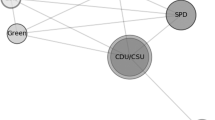Abstract
We model the process of coalition formation in the 16th German Bundestag as a hedonic coalition formation game. In order to induce players' preferences in the game we apply the Shapley value of the simple game describing all winning coalitions in the Bundestag. Using different stability notions for hedonic games we prove that the ``most'' stable government is formed by the Union Parties together with the Social Democratic Party.
Similar content being viewed by others
References
R. Aumann J. Dréze (1974) ArticleTitleCooperative Games with Coalition Structures International Journal of Game Theory 3 217–237 Occurrence Handle10.1007/BF01766876
A. Bogomolnaia M. Jackson (2002) ArticleTitleThe Stability of Hedonic Coalition Structures Games and Economic Behavior 38 201–230 Occurrence Handle10.1006/game.2001.0877
S. Banerjee H. Konishi T. Sönmez (2001) ArticleTitleCore in a Simple Coalition Formation Game Social Choice and Welfare 18 135–153 Occurrence Handle10.1007/s003550000067
J. F. Banzhaf SuffixIII (1965) ArticleTitleWeighted Voting Doesn't Work: A Mathematical Analysis Rutgers Law Review 19 317–343
D. Baron J. Ferejohn (1989) ArticleTitleBargaining in Legislatures American Political Science Review 83 1181–1206 Occurrence Handle10.2307/1961664
J. Deegan SuffixJr. E. W. Packel (1978) ArticleTitleA New Index of Power for Simple n-Person Games International Journal of Game Theory 7 113–123 Occurrence Handle10.1007/BF01753239
Dimitrov, D., and Haake, C.-J. (2006): ``Coalition Formation in Simple Games: The Semistrict Core''. IMW Working Paper 378, Bielefeld University.
J. R. Isbell (1956) ArticleTitleA Class of Majority Games Quarterly Journal of Mathmatics. Oxford 7 183–187
G. Kirchsteiger C. Puppe (1997) ArticleTitleOn the Formation of Political Coalitions Journal of Institutional and Theoretical Economics 153 293–319
M. Laver N. Schofield (1990) Multiparty Government: The Politics of Coalition in Europe Oxford University Press New York
W. Riker (1962) The Theory of Political Coalitions Yale University Press New Haven
A. Rusinowska H. Swart Particlede J. W. Rijt Particlevan der (2005) ArticleTitleA New Model of Coalition Formation Social Choice and Welfare 24 129–154 Occurrence Handle10.1007/s00355-003-0295-x
L. S. Shapley (1962) ArticleTitleSimple Games: An Outline of the Descriptive Theory Behavioral Science 7 59–66 Occurrence Handle10.1002/bs.3830070104
L. S. Shapley (1953) ArticleTitleA Value for n-Person Games Annals of Mathematics Studies 28 307–317
L. S. Shapley M. Shubik (1954) ArticleTitleA Method for Evaluating the Distribution of Power in a Committee System American Political Science Review 48 787–792 Occurrence Handle10.2307/1951053
P. P. Shenoy (1979) ArticleTitleOn Coalition Formation: A Game-theoretical Approach International Journal of Game Theory 8 133–164 Occurrence Handle10.1007/BF01770064
J. Snyder M. Ting S. Ansolabehere (2005) ArticleTitleLegislative Bargaining and Weighted Voting American Economic Review 95 IssueID4 981–1004 Occurrence Handle10.1257/0002828054825538
Sung, S.-C., and Dimitrov, D. (2005): “A Taxonomy of Myopic Stability Concepts for Hedonic Games”. IMW Working Paper 373, Bielefeld University.
Author information
Authors and Affiliations
Corresponding author
Rights and permissions
About this article
Cite this article
Dimitrov, D., Haake, CJ. Government versus Opposition: Who Should be Who in the 16th German Bundestag?. J Econ 89, 115–128 (2006). https://doi.org/10.1007/s00712-006-0207-5
Received:
Revised:
Published:
Issue Date:
DOI: https://doi.org/10.1007/s00712-006-0207-5




